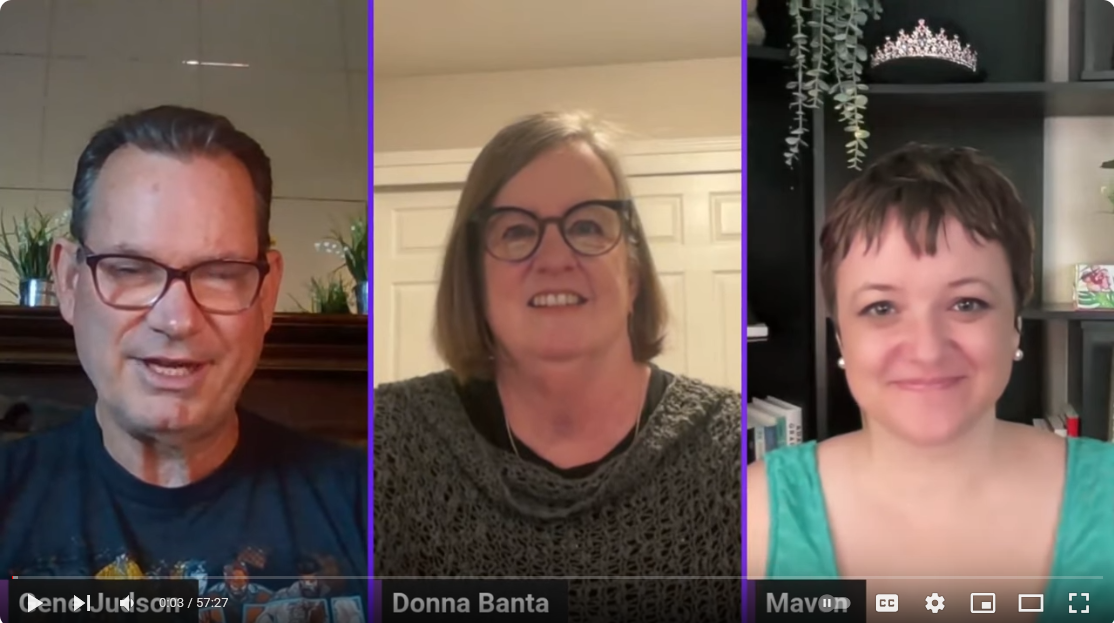
The Our Visions, Our Voices: A Mormon Womens Literary Tour is over now. It has been discussed quite extensively throughout the bloggernacle, but I find myself still thinking about the experience. I thought Id share those thoughts with you.
I was just back from the OVOV tour when my husband and I were watching a TV show about the brain. One of the neuroscientists said that every new experience changes the structure of the brain and that each physical change causes a permanent change in our perception. This way of looking at perception was not a new idea for me, but having just returned from the literary tour in Utah, it got me thinking. I thought about the process of writing and the experience of listening to the stories of the other women and wondered how both those processes might have affected my brain and the brains of the other women..
Im certain that my brain and my perception were changed dramatically in the process of writing my novel, Torn by God: A Familys Struggle with Polygamy. The things I learned about my parents have changed my relationship with them forever. My memories of them are now colored by a different perspective. Even my memories of myself have changed. One of the most powerful realizations I had while writing the book was that my fathers motivation for exploring polygamy was all wrapped up in his fascination with the old prophets and their unique and privileged relationship with God. He wanted to be like them and he believed it was possible. I came to see that it was because he was born and raised during a time when knowledge and acceptance of the old doctrine of the polygamy was still very much alive. His Grandfather was a polygamist, and yet the doctrine was being put aside by the current day prophet. The contradiction between the two positions of the Church caused great confusion in my fathers mind, and yet his romantic idealism made him lean toward the past. When I understood these influences at work on my fathers mind, his actions made perfect sense.
While writing Torn by God, I also realized something about my mother that I didnt know before: she had a deep belief in the word of the present day prophet, but she was also very much in love with my father. I realized that it was the contradiction between her emotions and her beliefs that made her powerless to do anything. She couldnt stop my father from exploring polygamy, nor could she join him, or leave him. She was stuck in a storm of conflicting beliefs and emotions.
Returning to the recent OVOV tour and my experience of the readings at the different universities, I started to think about Mormonism as a set of ideas and images and beliefs that create a particular perception of the world. Mix that with the unique and idiosyncratic perspectives of the women involved in the tour and you end up with a lot of variety tied to a common, recognizable thread. Its the common thread that allows free communication to take place, but it is the difference between our experiences that expands our minds. In other words, as a result of the literary tour, we all now have a larger catalogue of ideas and images and beliefs to consider when we think of our own Mormon experience. Is this the point where are brains and our perception have changed?
Theres something else to consider. When we engage our subjective experience on a day-to-day basis we are likely to see our own experience as truth, simply as the way things are. But in the act of trying to communicate our subjective experience to someone else through our writing, we are forced to take a more objective view of ourselves. Could it be that the process of formulating our stories and poems and essays is an activity that changes our brains too?
When we write, examining our subjective experiences from an objective view, refining the story or poem over several drafts, taking it in one direction and then the other, we begin to see that truth is malleable. Observing the malleability of subjective truth leads to the realization that all truth is malleable. It tells us that no one is right about truth and, more importantly, that no one is wrong. We are all just telling stories. Stories that reveal the possibilities of human consciousness. If all humans were to come to the conclusion that they dont have the corner on truth, would it be the end of war? Could we achieve world peace? Perhaps. All I know is that Our Visions, Our Voices: A Mormon Womens Literary Tour was a step in the right direction. Im glad to have been a part of it.

Thanks, Zoe, for sharing your experiences!!
This is the sort of thing I find really fascinating, particularly in light of BCC’s series on the history of correlation.
It’s hard to imagine what it was like for people who knew personally relatives who practiced “the principle” as a righteous sacrifice (but learned it was no longer to be practiced). It’s very different than the experience for those of us who learned it as distant history. And, naturally, stories can bring that perspective to life.
I agree with what you say, Carol. I hear there are some Church members these days who grow up not knowing that Joseph Smith practiced “the principle.” It’s hard for me to believe since it was so present in my life while I was growing up in that small Mormon town, not just because of my father’s explorations, but we heard about it in Church all the time and we lived just down the road from the Alta Academy of Reuben Jeffs.
I just finished re-reading a book by Jodi Picault called “Plain Truth”. It’s interesting how closely her character’s description of what happens in a courtroom resembles your description of the maleable nature of truth. Her character is an attorney who says that truth has no place in a courtroom. In a courtroom it is all about telling a story.. the defense tells its story and the prosecution tells its story and neither may be the “truth”.
Nice commentary, Zoe. I enjoyed the various perspectives in the OVOV too. I wish I could remember in my personal relationships this truth – that for each of us the truth is something different. Perhaps I’d be more understanding and less critical. You’ve given me something important to think about. Thanks!
Thanks for your comment, janmarie. I’ll have to take a look at Picault’s book. It sounds very interesting.
Good to meet you, Zoe. When our perceptions encounter Mormonism, we sometimes attribute divine authority to them.
Perhaps, that is the dynamic that drove your father’s life.
I am not sure that I would attribute the noun “truth” to the perceptions of people regardless of how sincere we are. Sincerity may be the foundation of honesty but that’s not the same as “truth.”
Whatever truth may be, there is an underlying reality. Whether we can know reality is another matter. But one thing is for sure, our misperceptions lead to collisions with reality and somebody gets hurt.
Polygamy, for example, hurt countless women. The first one was Emma Smith. Whatever Joseph may have perceived, Emma’s suffering was real. And when Joseph refused to ease it, he abused his wife.
There is suffering that we cannot escape. However, when we are too arrogant to submit our opinions to logic and evidence or when we impose our views on the lives of others then we are causing pain unnecessarily.
For those reasons, I am loath to attribute too much authority to people’s feelings and perceptions. Life is as much about others as it is about ourselves.
We have to figure out how to meet our needs while respecting the integrity of our neighbors.
Their stories are their own and deserve to be respected on their terms. They have the same right to liberty as we do and therefore our freedom ends where their’s begins.
Hi Hellmut,
Thanks for your thoughts. I found them to be very interesting.
I agree that we “cannot attribute the noun “truth” to the perceptions of people.” However, this subjective view of things is what most people take to be truth. Given the near impossibility of seeing reality without our subjective filters, it is the only truth we can experience. The key is to realize that our perception of things is subjective and biased according to our beliefs and experience. When we take that view, I think we do come a little closer to the real truth. And at the same time, it allows us to be more accepting of other ways of thinking – of perceiving.
Best,
Zoe
Thanks for your thoughtful response, Zoe. Like you, I think that human beings cannot know the truth. And if they were to possess the truth, there would be no way to know it.
However, there are things that we can do to expand our point of view. As you say, we can choose to empathize with someone else’s point of view.
We can also choose to submit our views to logic and evidence.
It requires effort, commitment and a struggle.
What troubles me a little bit is the notion of futility that seems to accompany your thinking. Human beings may not have as many choices as we would like to think about ourselves. But we can choose whether or not to take our neighbors’ views seriously.
When we do that, our perception changes because we will it.